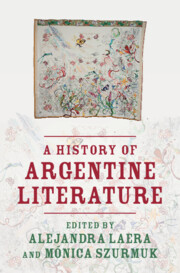Book contents
- A History of Argentine Literature
- A History of Argentine Literature
- Copyright page
- Contents
- Figures
- Contributors
- Editors’ Acknowledgments
- Introduction
- Part I Literary Dates
- Part II Critical Inroads
- Part III Literary Names
- Chapter 21 Sarmiento: Politics, Culture, and Spectacle
- Chapter 22 The Mansilla Siblings: A Story in Syntony
- Chapter 23 Martín Fierro: Subaltern Voices
- Chapter 24 Borges and Argentine Literature: A Detour around the World
- Chapter 25 Roberto Arlt
- Chapter 26 The Ocampo Sisters
- Chapter 27 Alfonsina Storni and Alejandra Pizarnik
- Chapter 28 Displacement and Transfer in Julio Cortázar’s Todos los fuegos el fuego
- Chapter 29 Manuel Puig’s Circuit Bending: Literary Listening against Surveillance
- Chapter 30 Operation Massacre: Dangerous Journalism
- Chapter 31 The Politics of the Poem: From Gelman to Perlongher
- Chapter 32 Scenes from Postmodern Life: Literary Interventions in the Public Sphere
- Chapter 33 Griselda Gambaro and Beyond: A “Dermography” of Contemporary Women’s Theater and Performance
- Chapter 34 César Aira and the Art of Invention
- Index
- References
Chapter 24 - Borges and Argentine Literature: A Detour around the World
from Part III - Literary Names
Published online by Cambridge University Press: 09 May 2024
- A History of Argentine Literature
- A History of Argentine Literature
- Copyright page
- Contents
- Figures
- Contributors
- Editors’ Acknowledgments
- Introduction
- Part I Literary Dates
- Part II Critical Inroads
- Part III Literary Names
- Chapter 21 Sarmiento: Politics, Culture, and Spectacle
- Chapter 22 The Mansilla Siblings: A Story in Syntony
- Chapter 23 Martín Fierro: Subaltern Voices
- Chapter 24 Borges and Argentine Literature: A Detour around the World
- Chapter 25 Roberto Arlt
- Chapter 26 The Ocampo Sisters
- Chapter 27 Alfonsina Storni and Alejandra Pizarnik
- Chapter 28 Displacement and Transfer in Julio Cortázar’s Todos los fuegos el fuego
- Chapter 29 Manuel Puig’s Circuit Bending: Literary Listening against Surveillance
- Chapter 30 Operation Massacre: Dangerous Journalism
- Chapter 31 The Politics of the Poem: From Gelman to Perlongher
- Chapter 32 Scenes from Postmodern Life: Literary Interventions in the Public Sphere
- Chapter 33 Griselda Gambaro and Beyond: A “Dermography” of Contemporary Women’s Theater and Performance
- Chapter 34 César Aira and the Art of Invention
- Index
- References
Summary
Borges is an Argentine writer whose work has deserved extensive and brilliant critical analyses. Reviewing the canonical interpretations (Ricardo Piglia, Sylvia Molloy, Daniel Balderston, Beatriz Sarlo, among others), this chapter seeks to rethink Borges’ work in the twenty-first century usiing two main approaches. The first will review the idea of “work” in Borges. As Annick Louis has studied, the unstable nature of his work demands a reconceptualization of the processes of construction of literature that expands the limits of the book, the author, and the text, and that circulates in different media (books, magazines, lectures, interviews, chats). A second way is to expand the dialogues and conversations that his textuality offers. Focused on the obvious literary bonds, most of his critics have read his work emphasizing the different forms of intertextuality. But Borges’ universe includes much more aesthetics and cultural practices, as Alan Pauls has shown. If Borges strongly questioned the ideas of the author and work, he also questioned the ideas of literature, art, culture, and media. The chapter also analyzes the place of Borges in the context of national culture and its relationship with world literature.
- Type
- Chapter
- Information
- A History of Argentine Literature , pp. 370 - 389Publisher: Cambridge University PressPrint publication year: 2024

